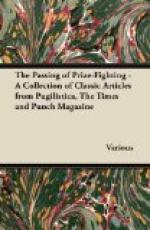“Isn’t it wonderful how he remembers his OMAR?” remarked Mac enthusiastically.
“I don’t know much poetry,” said Willoughby, whose tastes are sporting rather than literary, “but I always liked that bit.”
“But lunch,” I interposed, “is the pressing question. There’s sure to be an hotel at Waterfoot, as you say. Send a telegram there, asking for lunch for six. If there’s no hotel, no reply and no lunch. If there is we get our reply and our lunch. Willoughby can wire, because he learned all about telegraphs in the army.”
Within two hours came the reply. I opened it.
“Will supply luncheon for six, 1.15 to-day.”
“Can you remember what your wire said, Willoughby?” I asked mildly.
“Rather. ‘Can you provide luncheon for six at 1.15.—Willoughby.’”
“Exactly. Can’t you see, you silly ass, how you’ve muffed it? Read this.” Willoughby read, while Sylvia and Molly looked over and giggled.
“Hang it all! I suppose I ought to have said to-morrow,” he sighed. “Here, Thompson, you and Hilda, as the married couple of the party, ought to deal with these beastly emergencies.”
“Not I,” I replied. “You’ve got us in the muddle, now get us out. Wire and say it’s for to-morrow.”
“And then,” said my practical wife, “we shall get to-day’s hot lunch cold to-morrow, and a rapacious Scotch-woman will charge us for it twice over.”
“I wish you would say ‘Scots,’ not ‘Scotch,’” complained MacFadden.
“Sorry, Kiltie,” rejoined Hilda; “and perhaps one of you two will deal with the Scots woman.”
“Leave her to me and none of you interfere,” answered MacFadden. “Willoughby is no good at a job that needs tact. He’s not half as lovable as I am either. Is he, Molly? We’ll send the wire at once. Come on.”
Next day the steamer dropped us into the ferry-boat off Lochrie Bay, and our bicycles, more frightened than hurt, but much shaken, were hurled in after us. After five miles on a primitive road we arrived at the hotel very late.
MacFadden, assuring us that if we only kept quiet he would see us through in spite of any Scots innkeeper, led the way.
The landlady, a dour woman, appeared.
“Good morning, Madam,” began Mac politely.
“Will you be Mr. Willoughby?” she replied.
“No,” said Mac truthfully, assuming a puzzled expression.
“Weel, then,” resumed the lady, addressing Sylvia, who happened to be close behind, “will you be Mrs. Willoughby?”
Molly sniggered; Sylvia reddened and answered hastily, “No, I won’t!” at which Willoughby sighed audibly.
“What I wanted to ask you was whether perhaps you could be so kind as to give us a bit of bread and cheese or something,” said Mac ingratiatingly. “Of course one doesn’t expect a proper lunch in these places without ordering it beforehand.”
“And those that order beforehand dinna come,” she replied with some asperity. “A pairty of six ordered for yesterday then they telegraphs to say they mean to-day, and now they’re no here and the time lang gone by. I thocht ye were the pairty at first.”




